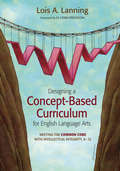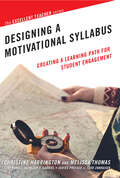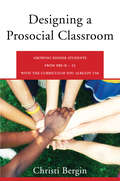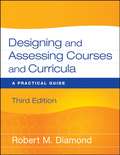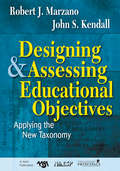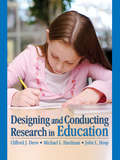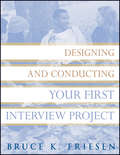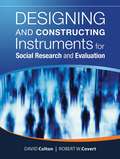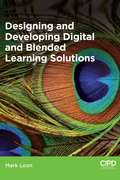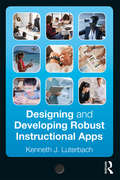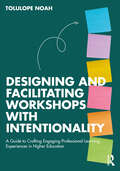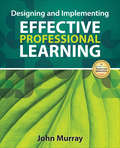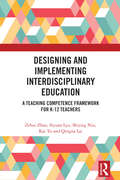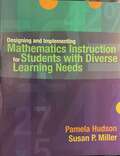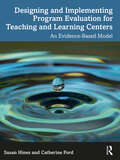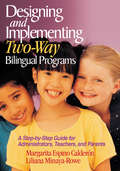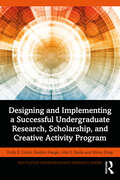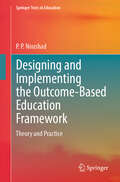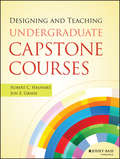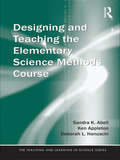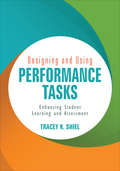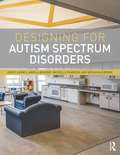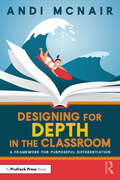- Table View
- List View
Designing a Concept-Based Curriculum for English Language Arts: Meeting the Common Core With Intellectual Integrity, K–12
by Lois A. LanningHow to ensure your ELA teaching sticks How can you teach for understanding and meet Common Core standards at the same time? The answer: with a concept-based curriculum. Fusing Lynn Erickson's groundbreaking curriculum model with implementation guidelines and sample units, this book puts you on the fast track to using concept-based curriculum in your school or district. Lanning shows you how to design a curriculum that: Functions as a framework for lesson plans Unites the efforts of ELA teachers district-wide Addresses core standards while focusing on student understanding Creates a ripple effect helping to align curriculum, assessments, and instruction
Designing a Motivational Syllabus: Creating a Learning Path for Student Engagement
by Christine Harrington Melissa ThomasA thoughtfully constructed syllabus can be transformative for your students’ learning, communicating the path they can take to succeed. This book demonstrates how, rather than being a mundane document to convey policies, you can construct your syllabus to be a motivating resource that conveys a clear sense of your course’s learning goals, how students can achieve those goals, and makes evident your teaching philosophy and why you have adopted the teaching strategies you will use, such as discussion or group activities. Developing or revising a syllabus also presents you with a perfect opportunity to review the learning possibilities for the semester. Well-designed, it can help you stay focused on achieving the learning outcomes, as well as determine if the class is on track and whether adjustments to the schedule are needed. The authors show how, by adopting a welcoming tone and clearly stating learning outcomes, your syllabus can engage students by explaining the relevance of your course to their studies, create an all-important positive first impression of you as an instructor, and guide students through the resources you will be using, the assignments ahead, as well as clear guidance on how they will be assessed. Referred to frequently as the course progresses, an effective syllabus will keep students engaged and on task.Christine Harrington and Melissa Thomas lead you through all the elements of a syllabus to help you identify how to present key messages and information about your course, think through the impressions you want to create, and, equally importantly, suggest how you can use layout and elements such as images and charts to make your syllabus visually appealing and easy to navigate.
Designing a Prosocial Classroom: Fostering Collaboration In Students From Prek-12 With The Curriculum You Already Use
by Christi BerginA practical how-to guide for promoting positive classroom cultures. A prosocial classroom is easy to spot! Students are engaged in learning, have a warm relationship with the teacher, and can collaborate smoothly; conflicts and behavioral problems are the exception rather than the rule. Not only are students happier in this kind of positive environment, their academic achievement improves. But it's far from obvious how to establish and maintain such a productive and peaceful classroom. In Designing a Prosocial Classroom, Christi Bergin has distilled the complex literature about social-emotional learning into a set of tools that all teachers can use to promote prosocial behavior. As with any skill, fostering kindness and collaboration requires deliberate practice; but it does not require a separate curriculum. These research-based tools—using effective discipline, building prosocial habits, developing positive relationships, modeling good coping strategies—are teaching practices that can be employed within any content area during regular instruction. Each chapter includes authentic classroom vignettes, highlights from the research on prosocial behavior, and questions for reflection and discussion. Designing a Prosocial Classroom is an engaging read and an ideal resource for a school-wide book study group; included in an appendix is a case study for review and discussion of the teaching tools presented in the chapters.
Designing and Assessing Courses and Curricula
by Diamond Robert M.Designing and Assessing Courses and Curricula reflects the most current knowledge and practice in course and curriculum design and connects this knowledge with the critical task of assessing learning outcomes at both course and curricular levels. This thoroughly revised and expanded third edition of the best-selling book positions course design as a tool for educational change and contains a wealth of new material including new chapters, case examples, and resources.
Designing and Assessing Educational Objectives: Applying the New Taxonomy
by Robert J. Marzano John S. KendallEducators across grade levels and content areas can apply the concepts of Marzano's New Taxonomy to turn standards into concrete objectives and assessments to measure student learning.
Designing and Conducting Research in Education
by Dr Clifford J. Drew Michael L Hardman John L. Hosp"The authors did an excellent job of engaging students by being empathetic to their anxieties while taking a research design course. The authors also present a convincing case of the relevancies of research in daily life by showing how information was used or misused to affect our personal and professional decisions." —Cherng-Jyh Yen, George Washington University A practice-oriented, non-mathematical approach to understanding, planning, conducting, and interpreting research in educationPractical and applied, Designing and Conducting Research in Education is the perfect first step for students who will be consuming research as well as for those who will be actively involved in conducting research. Readers will find up-to-date examinations of quantitative, qualitative, and mixed-methods research approaches which have emerged as important components in the toolbox of educational research. Real-world situations are presented in each chapter taking the reader through various challenges often encountered in the world of educational research. Key Features:Examines quantitative, qualitative, and mixed-methods research approaches, which have emerged as important components in the toolbox of educational researchExplains each step of the research process very practically to help students plan and conduct a research project in educationApplies research in real-world situations by taking the reader through various challenges often encountered in field settings Includes a chapter on ethical issues in conducting researchProvides a Student study site that offers the opportunity to interact with contemporary research articles in educationInstructor Resources on CD provide a Computerized test bank, Sample Syllabi, General Teaching Tips and moreIntended audience: This book provides an introduction to research that emphasizes the fundamental concepts of planning and design. The book is designed to be a core text for the very first course on research methods. In some fields the first course is offered at an undergraduate level whereas in others it is a beginning graduate class."The book is perfect for introductory students. The language is top notch, the examples are helpful, and the graphic features (tables, figures) are uncomplicated and contain important information in an easy-to-understand format. Excellent text!" —John Huss, Northern Kentucky University "Designing and Conducting Research in Education is written in a style that is conducive to learning for the type of graduate students we teach here in the College of Education. I appreciate the 'friendly' tone and concise writing that the authors utilize." —Steven Harris, Tarleton State University"A hands on, truly accessible text on how to design and conduct research" —Joan P. Sebastian, National University
Designing and Conducting Your First Interview Project
by Bruce K. FriesenDesigning and Conducting Your First Interview ProjectUsing a clear, easily followed approach, Designing and Conducting Your First Interview Project helps anyone new to the process develop the skills to conduct the most essential part of social research data collection: the interview. The book also shows how to organize, analyze, and interpret the data. This workbook provides a step-by-step template for a collaborative class experience in social science. Organized according to the steps of the deductive scientific method, it includes essential activities to take place during class after the appropriate chapter has been read. The book begins with the process of choosing a topic and proceeds through hypothesis development, interview data collection, data entry using SPSS, and elementary data analysis. The final chapter includes the formal assignment and instructions to students on how to write about their experiences in a way that will produce an excellent final paper. By selecting the hypothesis, gathering the data, and analyzing the results, students will gain an appreciation for the strengths and potential weaknesses of "knowing" things through doing quantitative social science.
Designing and Constructing Instruments for Social Research and Evaluation
by David Colton Robert W. CovertWritten in easy-to-understand language, this important text provides a systematic and commonsense approach to developing instruments for data collection and analysis. This book can be used by both those who are developing instruments for the first time and those who want to hone their skills, including students, agency personnel, program managers, and researchers. This book provides a thorough presentation of instrument construction, from conception to development and pre-testing of items, formatting the instrument, administration, and, finally, data management and presentation of the findings. Throughout the book, the authors emphasize how to create an instrument that will produce trustworthy and accurate data. To that end they have included guidelines for reviewing and revising the questionnaire to enhance validity and reliability. They also show how to work effectively with stakeholders such as instruments designers, decision-makers, agency personnel, clients, and raters or respondents.
Designing and Developing Digital and Blended Learning Solutions
by Mark LoonDesigning and Developing Digital and Blended Learning Solutions is essential reading for anyone studying the Level 5 CIPD L&D module of the same name as well as all learning and development professionals looking to understand the growing role of technology in L&D. Covering both current and emerging learning technologies, this book will help readers assess which technologies are right for their needs. It also covers how to design blended learning solutions, how to develop digital learning content as well as how to evaluate the effectiveness of this digital content. Most importantly, Designing and Developing Digital and Blended Learning Solutions provides guidance on how to implement digital and blended learning solutions including identifying the appropriate platforms and the roles, tools and processes needed to support effective implementation. Full of practical examples and advice, this is an invaluable guide for students and practitioners alike.
Designing and Developing Robust Instructional Apps
by Kenneth J. LuterbachDesigning and Developing Robust Instructional Apps advances the state of instructional app development using three learning paradigms for building knowledge foundations, problem-solving, and experimentation. Drawing on research and development lessons gleaned?from noted educational technologists, time-tested systematic instructional design processes, and results from user experience design, the book considers the planning and specification of instructional apps that blend media (text, images, sound, and moving pictures) and instructional method. Further, for readers with little to no programming experience, introductory treatments of JavaScript and Python, along with data fundamentals and machine learning techniques, offer a guided journey that produces robust instructional apps and?concludes with next steps for advancing the state of instructional app development.
Designing and Facilitating Workshops with Intentionality: A Guide to Crafting Engaging Professional Learning Experiences in Higher Education
by Tolulope NoahDesigning and Facilitating Workshops with Intentionality offers practical guidance, tools, and resources to assist practitioners in creating effective, engaging workshops for adult learners.Drawing from three key learning frameworks and the author’s considerable expertise in facilitating workshops across both educational and corporate settings, this book focuses on ten essential principles to consider when developing professional learning experiences. Whether facilitating on-site or virtually, readers will gain a deeper understanding of how to design and facilitate workshops with an inclusive mindset, thus creating meaningful, active learning opportunities that result in greater involvement among participants and better feedback. Guiding questions, chapter takeaways, and a compendium of additional online resources supply plentiful opportunities to further build and fine-tune these skills.Within these pages, both new and seasoned facilitators will find inspiration, encouragement, and support, as they craft professional learning experiences that ignite curiosity and spark growth in all learners.
Designing and Implementing Effective Professional Learning
by John M. MurrayFor sustained success, educators must commit to their own lifelong improvement. A clear correlation exists between level of focus on teacher professional development (PD) and student success. In this book, John Murray identifies the characteristics of effective professional learning, detailing eight strategies for planning, and executing, and evaluating PD programs. Content includes: The proven “backward” approach to articulating the goals of your PD program Descriptions of innovative and effective designs for professional learning such as Lesson Study and Instructional Rounds Powerful approaches to designing and implementing online PD
Designing and Implementing Interdisciplinary Education: A Teaching Competence Framework for K-12 Teachers
by Zehui Zhan Siyuan Lyu Shijing Niu Kai Tu Qingna LaiInterdisciplinary education is the future trend in global K-12 curriculum reform, and all K-12 subject teachers should be prepared to meet the challenges it presents. This book aims to explore the competence structure that K-12 teachers need to effectively design and implement interdisciplinary education from a general perspective of subject integration.Drawing on relevant theories from interdisciplinary education and teacher competence research, the book clarifies the fundamental connotations of teachers’ interdisciplinary teaching competence and identifies the key elements of this competence from an international perspective. It also examines the transformation pathways for teachers from subject-specific teaching to interdisciplinary teaching based on China’s national curriculum framework. On this basis, the book constructs a framework for K-12 teachers’ interdisciplinary teaching competence and applies it to the cultivation of interdisciplinary teaching staff, guiding the design of assessment tools, improvement strategies, and training programs for enhancing interdisciplinary teaching competence.The book will encourage teachers from different disciplines to participate in the design and implementation of interdisciplinary teaching, thereby promoting the sustainable development of interdisciplinary education. Global educators and researchers interested in interdisciplinary education, competence framework development, teacher professional development, and Chinese education will find valuable insights in this book.
Designing and Implementing Mathematics Instruction for Students with Diverse Learning Needs
by Susan Miller Pamela HudsonThis exciting new book integrates the explicit teaching practices that have proven effective for students with disabilities with the NCTM math standards that dominant current mathematics practices in the United States . <p><p>In Part 1 of the book, teachers learn the fundamentals of mathematics assessment and instructional design for conceptual, declarative knowledge, procedural, and problem-solving lessons. In Part 2, the detailed scope and sequence charts, along with instructional guidelines keyed to the objectives, provide teachers with specific guidelines for assessment and design. <p><p>The curriculum-based assessment chapter (Ch. 2) helps teachers group students for instruction, place in curriculum, monitor performance, and make data based decisions. Content coverage of all five NCTM content standards provides teachers the support needed to access the general education curriculum and help their students meet annual yearly progress expectations (Chapters 7 ― 15). Detailed scope and sequence charts provide a valuable resource for assessing, planning, and designing instruction (Chapters 7-15). Instructional design discussion includes four domains: concepts, declarative knowledge, problem solving, and procedural knowledge. When teachers understand the function of the instruction, their effectiveness and efficiency are enhanced (Chapters 3-15). Integration of explicit teaching practices with NCTM approach helps teachers maintain practices that work for students with diverse needs while integrating reformed-based mathematics practices (in Chapters 1, 7-15). Detailed guidelines, including scripted lessons, on HOW to design and deliver effective instruction. These sample lessons illustrate how to apply the explicit teaching sequence to various content areas and provide examples for preservice and inservice teachers to use when developing their own lessons.
Designing and Implementing Microsoft DevOps Solutions AZ-400 Exam Guide: Prepare for the certification exam and successfully apply Azure DevOps strategies with practical labs, 2nd Edition
by Henry Been Maik van Gaag Subhajit Chatterjee Swapneel DeshpandeWritten by Microsoft MVPs and Azure experts, this comprehensive guide comes with self-study exercises to help you understand the concepts better and move closer to becoming a skilled Azure DevOps engineerKey FeaturesExplore a step-by-step approach to designing and creating a successful DevOps environmentUnderstand how to implement continuous integration and continuous deployment pipelines on AzureIntegrate and implement security, compliance, containers, and databases in your DevOps strategiesBook DescriptionThe AZ-400 Designing and Implementing Microsoft DevOps Solutions certification helps DevOps engineers and administrators get to grips with practices such as continuous integration and continuous delivery (CI/CD), containerization, and zero downtime deployments using Azure DevOps Services.This new edition is updated with advanced topics such as site reliability engineering (SRE), continuous improvement, and planning your cloud transformation journey. The book begins with the basics of CI/CD and automated deployments, and then moves ahead to show you how to apply configuration management and Infrastructure as Code (IaC) along with managing databases in DevOps scenarios. As you make progress, you'll explore fitting security and compliance with DevOps and find out how to instrument applications and gather metrics to understand application usage and user behavior. This book will also help you implement a container build strategy and manage Azure Kubernetes Services. Lastly, you'll discover quick tips and tricks to confidently apply effective DevOps practices and learn to create your own Azure DevOps organization.By the end of this DevOps book, you'll have gained the knowledge needed to ensure seamless application deployments and business continuity.What you will learnGet acquainted with Azure DevOps Services and DevOps practicesDiscover how to efficiently implement CI/CD processesBuild and deploy a CI/CD pipeline with automated testing on AzureIntegrate security and compliance in pipelinesUnderstand and implement Azure Container ServicesEffectively close the loop from production back to developmentApply continuous improvement strategies to deliver innovation at scaleWho this book is forThe book is for anyone looking to prepare for the AZ-400 certification exam. Software developers, application developers, and IT professionals who want to implement DevOps practices for the Azure cloud will also find this book helpful. Familiarity with Azure DevOps basics, software development, and development practices is recommended but not necessary.
Designing and Implementing Program Evaluation for Teaching and Learning Centers: An Evidence-Based Model
by Catherine Ford Susan HinesThis practical guide equips educational developers with a clear, systematic approach to evaluating the impact of their center’s programs.Evaluation data and evidence can serve as powerful tools to demonstrate alignment with strategic priorities and to construct compelling narratives that highlight the value added by educational development opportunities. Drawing from 10 years of in-depth research investigating how teaching and learning centers evaluate their programs, this book provides a four-phase model flexible enough to fit centers of any size. The authors’ accessible, outcomes-based approach outlines essential steps and strategies in designing and implementing an evaluation plan tailored to their center’s specific needs. The illustrative figures, practical examples, customizable templates, and real-world scenarios ensure that the model is comprehensive, while also being straightforward and easy to apply.This book is an indispensable resource for directors and staff working in teaching and learning centers, chief academic officers and deans, and administrators responsible for educational development at the college level.
Designing and Implementing Two-Way Bilingual Programs: A Step-by-Step Guide for Administrators, Teachers, and Parents
by Margarita Espino Calderon Dr Liliana Minaya-RoweThis indispensable handbook includes professional development plans that meet the specific needs of dual-language programs, strategies for building learning communities for dual-language teachers, and tips for involving parents.
Designing and Implementing a Successful Undergraduate Research, Scholarship and Creative Activity Program (Routledge Undergraduate Research Series)
by John Banks Holly Unruh Heather Haeger Winny DongDesigning and Implementing a Successful Undergraduate Research, Scholarship and Creative Activity Program is designed as a resource for faculty, administrators, and university leaders interested in developing new, or expanding existing, undergraduate research programs. The book provides a practical handbook addressing the many "how to" questions associated with running a successful undergraduate research enterprise – ranging from how to organize an undergraduate research office, to how to find funding, foster cross-campus relationships, and develop learning outcomes for students in order to maximize the benefits of the research experience. It also addresses best practices in mentoring, how faculty mentorship fits within the discussion of tenure and promotion, and the basics of assessment, for both funder reporting and program improvement.Containing a series of vignettes offering specific advice from program directors, faculty mentors, and university administrators from a diverse array of universities and colleges, this book showcases their hands-on tips, advice, and lessons learned. Addressing key issues through real-world experience, the authors show how to build effective cross-disciplinary undergraduate research programs with positive impacts for students and faculty.
Designing and Implementing the Outcome-Based Education Framework: Theory and Practice (Springer Texts in Education)
by P. P. NoushadThis textbook presents a theoretical overview of the idea of Outcome Based Education (OBE), together with research and practical inputs for practitioners. It discusses the evolution of the ideas of OBE, Aligning Outcome and Curricular Content, Aligning Outcome and Modes of Transaction, and Aligning Outcome and Evaluation. It also provides practical guidelines with illustrations on how to design courses and curricula for school education, as well as higher education, using the OBE Framework. It serves as a useful guide for students, teachers of all levels, teacher educators, and other educational practitioners.
Designing and Teaching Undergraduate Capstone Courses
by Jon E. Grahe Robert C. HauhartEnrich your students and the institution with a high-impact practiceDesigning and Teaching Undergraduate Capstone Courses is a practical, research-backed guide to creating a course that is valuable for both the student and the school. The book covers the design, administration, and teaching of capstone courses throughout the undergraduate curriculum, guiding departments seeking to add a capstone course, and allowing those who have one to compare it to others in the discipline. The ideas presented in the book are supported by regional and national surveys that help the reader understand what's common, what's exceptional, what works, and what doesn't within capstone courses. The authors also provide additional information specific to different departments across the curriculum, including STEM, social sciences, humanities, fine arts, education, and professional programs.Identified as a high-impact practice by the National Survey of Student Engagement (NSSE) and the Association of American Colleges and Universities' LEAP initiative, capstone courses culminate a student's final college years in a project that integrates and applies what they've learned. The project takes the form of a research paper, a performance, a portfolio, or an exhibit, and is intended to showcase the student's very best work as a graduating senior. This book is a guide to creating for your school or department a capstone course that ties together undergraduate learning in a way that enriches the student and adds value to the college experience.Understand what makes capstone courses valuable for graduating studentsDiscover the factors that make a capstone course effective, and compare existing programs, both within academic disciplines and across institutionsLearn administrative and pedagogical techniques that increase the course's successExamine discipline-specific considerations for design, administration, and instructionCapstones are generally offered in departmental programs, but are becoming increasingly common in general education as well. Faculty and administrators looking to add a capstone course or revive an existing one need to understand what constitutes an effective program. Designing and Teaching Undergraduate Capstone Courses provides an easily digested summary of existing research, and offers expert guidance on making your capstone course successful.
Designing and Teaching the Elementary Science Methods Course (Teaching and Learning in Science Series)
by Ken Appleton Sandra K. Abell Deborah L. HanuscinWhat do aspiring and practicing elementary science teacher education faculty need to know as they plan and carry out instruction for future elementary science teachers? This scholarly and practical guide for science teacher educators outlines the theory, principles, and strategies needed, and provides classroom examples anchored to those principles. The theoretical and empirical foundations are supported by scholarship in the field, and the practical examples are derived from activities, lessons, and units field-tested in the authors’ elementary science methods courses. Designing and Teaching the Elementary Science Methods Course is grounded in the theoretical framework of pedagogical content knowledge (PCK), which describes how teachers transform subject matter knowledge into viable instruction in their discipline. Chapters on science methods students as learners, the science methods course curriculum, instructional strategies, methods course assessment, and the field experience help readers develop their PCK for teaching prospective elementary science teachers. "Activities that Work" and "Tools for Teaching the Methods Course" provide useful examples for putting this knowledge into action in the elementary science methods course.
Designing and Using Performance Tasks: Enhancing Student Learning and Assessment
by Tracey K. ShielStretch student thinking with performance-based tasks. With the continual increase of high-stakes assessments also comes the surge of professional development on designing performance-based tasks. Providing step-by-step insights, this book shows you how to incorporate performance tasks as a tool to teach, monitor, and extend student learning. If you’re ready to stretch your students’ thinking, grab a copy of this how-to guide to help you: Make instructional decisions based on student performance of learning tasks Incorporate learning progressions as an integral part of planning performance tasks Close the “knowing–doing” gap by focusing on considerations for successful implementation
Designing and Using Performance Tasks: Enhancing Student Learning and Assessment
by Tracey K. ShielStretch student thinking with performance-based tasks. With the continual increase of high-stakes assessments also comes the surge of professional development on designing performance-based tasks. Providing step-by-step insights, this book shows you how to incorporate performance tasks as a tool to teach, monitor, and extend student learning. If you’re ready to stretch your students’ thinking, grab a copy of this how-to guide to help you: Make instructional decisions based on student performance of learning tasks Incorporate learning progressions as an integral part of planning performance tasks Close the “knowing–doing” gap by focusing on considerations for successful implementation
Designing for Autism Spectrum Disorders
by Angela Bourne Michelle Pearson Kristi Gaines Mesha KleibrinkWinner of the 2017 IDEC Book Award, 2017 EDRA Great Places Award (Book Category), 2017 American Society of Interior Designers Joel Polsky Prize and the 2016 International Interior Design Association TXOK Research Award Designing for Autism Spectrum Disorders explains the influence of the natural and man-made environment on individuals with autism spectrum disorders (ASD) and other forms of intellectual/developmental disabilities (IDD). Drawing on the latest research in the fields of environmental psychology and education, the authors show you how architecture and interior spaces can positively influence individuals with neurodiversities by modifying factors such as color, lighting, space organization, textures, acoustics, and ventilation. Now you can design homes, therapeutic environments, work environments, and outdoor spaces to encourage growth and learning for the projected 500,000 children with ASD (in the United States alone) who are expected to reach adulthood by 2024. Topics discussed include:-Environmental design theories-Symptoms of ASD-Sensory processing deficits -Design needs of individuals on the spectrum at all ages-Design methods and solutions for spaces, including residential, learning, work, and therapeutic environments encompassing a wide range of budgets-Designing for self-actualization, well-being, and a high quality of life for the duration of an individual's life-Avenues for healthy living and aging in place-Biophilic design-Environmental impact on well-being -Strategies to promote active living as an integral part of the welfare focus.
Designing for Depth in the Classroom: A Framework for Purposeful Differentiation
by Andi McNairDifferentiate your gifted classroom by designing experiences instead of writing lessons plans with Designing for Depth in the Classroom: A Framework for Purposeful Differentiation. Addressing the specific needs of countless learners doesn’t have to be overwhelming and unsustainable! In her dynamic new book, Andi McNair guides readers through a fresh mindset and process for designing meaningful experiences that leave learners engaged, empowered, and motivated to move from surface-level learning to deep understanding. Chapters cover topics such as project-based learning, authentic engagement, supporting and encouraging learners in the classroom and beyond, and the many ways to provide depth, with space provided at the end of each chapter for reflection questions and key takeaways. With practical strategies, advice, and examples imparted in a refreshing conversational tone, this valuable resource is required reading for all educators interested in challenging and exciting their students in a meaningful and manageable way.
